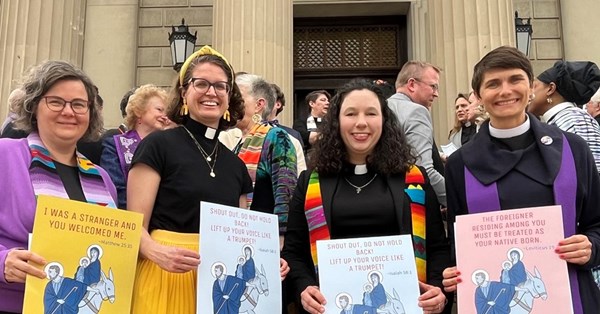CHRISTIAN and Jewish groups in the United States have asked a judge to block immigration raids on places of worship, arguing that it is threatening their religious freedom.
A federal judge heard a case brought by an interfaith group of 27 Christian denominations and Jewish groups on Friday at the US District Court in Washington. They argue that the reversal in policy under President Trump to allow immigration agents to raid “sensitive locations”, including places of worship, infringes on their freedom to worship and minister to those in need, and has already resulted in decreased attendance because of worshippers’ fear of arrest.
Their submission to the court reads: “An enforcement action during worship services or other church activities will harm member churches by interfering with their ability to gather, worship, and serve together. It will inject fear, intimidation, and trauma into worship spaces crafted to provide safety, sanctuary, and community. And it will contradict the member churches’ core belief in welcoming the stranger (including immigrants and foreigners) as one of their own.
“Congregations are experiencing decreases in worship attendance and social services participation due to fear of immigration enforcement action. For the vulnerable congregants who continue to attend worship services, congregations must choose between either exposing them to arrest or undertaking security measures that are in direct tension with their religious duties of welcome and hospitality.”
The Episcopal News Service (ENS), which was allowed to listen over the phone to the hearing, reported that one of the lawyers for the 27 groups told the court: “These are sacred spaces. Having armed agents come into their spaces and desecrate their worship area is a profound injury.”
The case brought by the faith groups lists examples of federal agents’ photographing people waiting at a food pantry run by a church, and congregations’ installing people at the door to watch for immigration officials, in an effort to reassure worshippers.
But lawyers for the Trump administration argued that the plaintiffs had not proved that their congregations had been unduly targeted, or that their religious activity had been targeted, and that only one example of immigration agents’ arresting someone at a church had been cited.
Kristina Wolfe, a lawyer for the Department of Homeland Security, said: “They have not demonstrated that their places of worship are special law-enforcement priorities, that they have been singled or targeted for enforcement. . . The government does have a compelling interest in ensuring and enforcing our nation’s immigration laws.”
The hearing lasted two hours. Judge Dabney Freidrich said that she would deliver her opinion on the case in the next two weeks.
The Episcopal Church is one of 12 denominations to have joined the lawsuit.
An interfaith prayer vigil was held in Washington the night before the hearing. In a written statement to the ENS, the Presiding Bishop of the Episcopal Church, Dr Sean Rowe, said: “We know that we cannot worship freely if some of us are living in fear, and I pray that this lawsuit enables us to gather and fully practice our faith in loving our neighbours as ourselves.”
The US Conference of Catholic Bishops (USCCB) has said that it will end its partnership with the federal government to serve children and refugees, as a result of the Trump administration’s halting of refugee resettlement programmes.
In a statement released this week, the President of the USCCB, the Most Revd Timothy Broglio, said that the government’s policies had forced it into making the “heartbreaking decision”, as the halt to funding meant that it could not continue its work.
The UCCB has been in partnership with the federal government to assist and resettle refugees for decades. Founded in 1917 to help RC soldiers, it began its work helping displaced families to move to the US in 1920.
The Archbishop said: “Over the years, partnerships with the federal government helped expand lifesaving programs, benefiting our sisters and brothers from many parts of the world. All participants in these programs were welcomed by the US government to come to the United States and underwent rigorous screening before their arrival. These are displaced souls who see in America a place of dreams and hope.
“Some assisted American efforts abroad at their own risk and more seek a place to worship and pray safely as they know God calls them. Our efforts were acts of pastoral care and charity, generously supported by the people of God when funds received from the government did not cover the full cost.
“As a national effort, we simply cannot sustain the work on our own at current levels or in current form,” he said.
A lawsuit lodged by RC bishops in February against the halt to aid funding was ordered by a federal judge to be heard in the Court of Federal Claims. That decision is being appealed against.

















